Publications
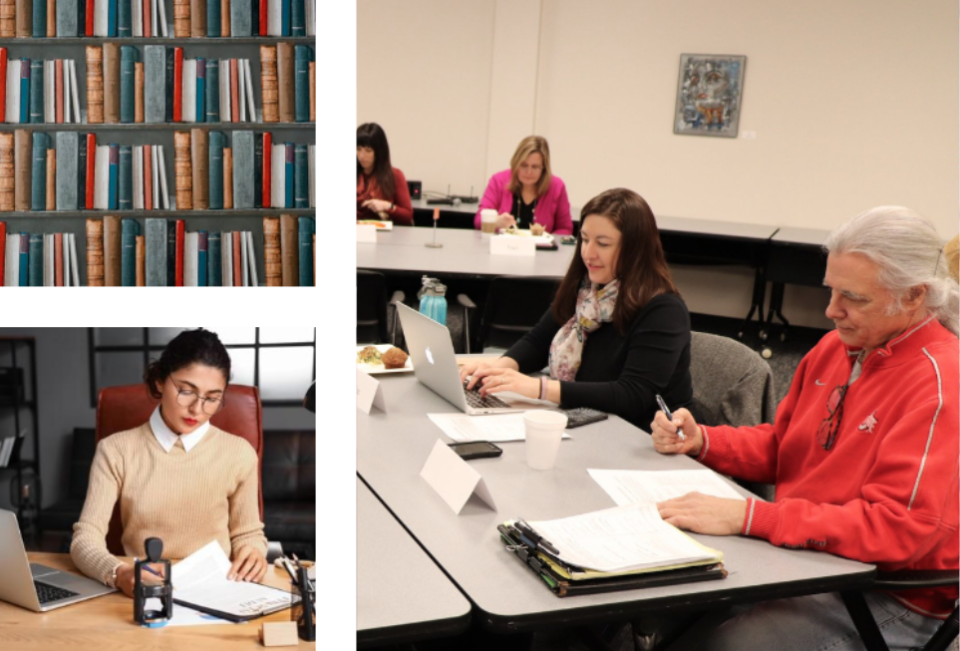
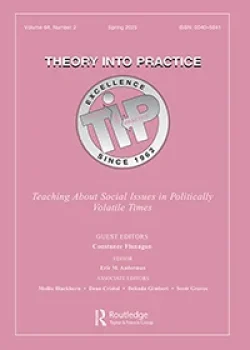
Realizing the possibilities of the large language models: Strategies for prompt engineering in educational inquiries
Correia, A. P., Hickey, S., & Xu, F. (2025). Realizing the possibilities of the large language models: Strategies for prompt engineering in educational inquiries. Theory Into Practice. https://doi.org/10.1080/00405841.2025.2528545 Abstract This...
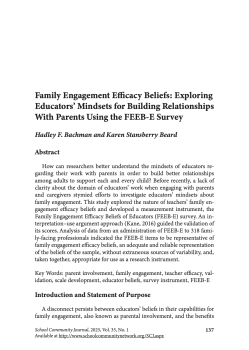
Family engagement efficacy beliefs: Exploring educators’ mindsets for building relationships with parents using the FEEB-E survey
Bachman, H., & Beard, K. (2025). Family engagement efficacy beliefs: Exploring educators’ mindsets for building relationships with parents using the FEEB-E survey. School Community Journal, 35(1), 137–168. https://www.adi.org/journal/SS2025/BachmanBeard.pdf Abstract...
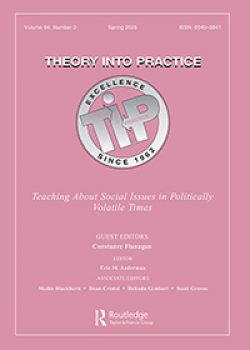
Centering dignitary safety in curriculum challenges: A heuristic for school administrators
Capretta, T., Bachman, H. F., & Zhang, J. (2025). Centering dignitary safety in curriculum challenges: A heuristic for school administrators. Theory Into Practice, 64(2), 125-138. https://doi.org/10.1080/00405841.2025.2453354 Abstract Debates about what...
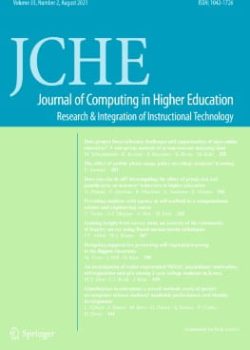
Reframing research agendas: Translational research to address broader social issues in educational technology
Correia, A.-P., Xu, F., & Julian, D. A. (2025). Reframing research agendas: Translational research to address broader social issues in educational technology. Journal of Computing in Higher Education. https://doi.org/10.1007/s12528-025-09453-5 ...
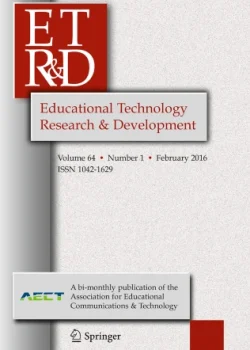
Determining mobile learning acceptance outside the classroom: An integrated acceptance model
Correia, A.-P., Liu, C., & Kim, Y. M. (2025). Determining mobile learning acceptance outside the classroom: An integrated acceptance model. Educational Technology Research and Development. https://doi.org/10.1007/s11423-025-10514-w Abstract Mobile learning can...
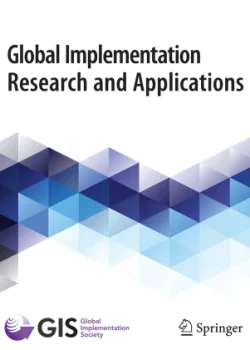
Duties and tasks associated with translation: Implications for implementation
Julian, D. A., Correia, A.-P., Fergus, K., Moser, J., Lepicki, T., Johnson, G., Ross, M., Boone, B., Hickey, S., McHugh, B., & Smith, D. (2025). Duties and tasks associated with...
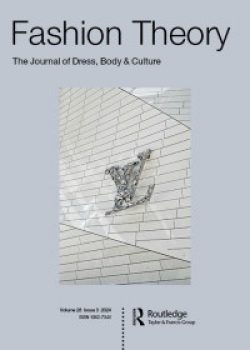
Work Attire and Work Productivity of Employees While Teleworking During the COVID-19 Pandemic
Bartosiak, A., Loibl, C., & Hillery, J. (2024). Work Attire and Work Productivity of Employees While Teleworking During the COVID-19 Pandemic. Fashion Theory, 28(3), 359-391. https://doi.org/10.1080/1362704X.2024.2342611 Abstract The COVID-19 pandemic...
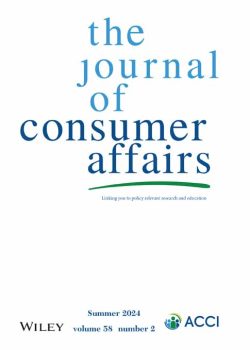
Financial stress among college students: New data about student loan debt, lack of emergency savings, social and personal resources
Danahy, R., Loibl, C., Montalto, C. P., & Lillard, D. (2024). Financial stress among college students: New data about student loan debt, lack of emergency savings, social and personal resources....
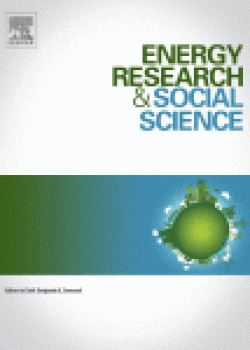
Self-affirmed for saving energy in the United States: Cognition, intention, and behavior
Chen, C., Loibl, C., Whitmarsh, L., Moulton, S., & Yi, H. (2024). Self-affirmed for saving energy in the United States: Cognition, intention, and behavior. Energy Research & Social Science, 118,...
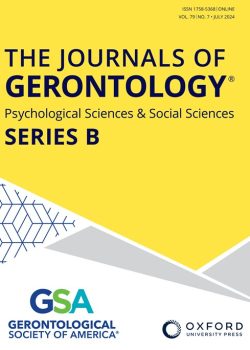
Mortgage Borrowing and Chronic Disease Outcomes in Older Age: Evidence From Biomarker Data in the Health and Retirement Study
Rhodes, A., Moulton, S., Loibl, C., Haurin, D., & Joseph, J. (2024). Mortgage Borrowing and Chronic Disease Outcomes in Older Age: Evidence From Biomarker Data in the Health and Retirement...
2023-2025 selected publications
54. Correia, A. P., Hickey, S., & Xu, F. (2025). Realizing the possibilities of the large language models: Strategies for prompt engineering in educational inquiries. Theory Into Practice. https://doi.org/10.1080/00405841.2025.2528545
53. Bachman, H., & Beard, K. (2025). Family engagement efficacy beliefs: Exploring educators’ mindsets for building relationships with parents using the FEEB-E survey. School Community Journal, 35(1), 137–168. https://www.adi.org/journal/SS2025/BachmanBeard.pdf
52. Capretta, T., Bachman, H. F., & Zhang, J. (2025). Centering dignitary safety in curriculum challenges: A heuristic for school administrators. Theory Into Practice, 64(2), 125-138. https://doi.org/10.1080/00405841.2025.2453354
51. Correia, A.-P., Xu, F., & Julian, D. A. (2025). Reframing research agendas: Translational research to address broader social issues in educational technology. Journal of Computing in Higher Education. https://doi.org/10.1007/s12528-025-09453-5
50. Correia, A.-P., Liu, C., & Kim, Y. M. (2025). Determining mobile learning acceptance outside the classroom: An integrated acceptance model. Educational Technology Research and Development. https://doi.org/10.1007/s11423-025-10514-w
49. Julian, D. A., Correia, A.-P., Fergus, K., Moser, J., Lepicki, T., Johnson, G., Ross, M., Boone, B., Hickey, S., McHugh, B., & Smith, D. (2025). Duties and tasks associated with translation: Implications for implementation. Global Implementation Research and Applications. https://doi.org/10.1007/s43477-025-00167-5
48. Bartosiak, A., Loibl, C., & Hillery, J. (2024). Work Attire and Work Productivity of Employees While Teleworking During the COVID-19 Pandemic. Fashion Theory, 28(3), 359-391. https://doi.org/10.1080/1362704X.2024.2342611
47. Danahy, R., Loibl, C., Montalto, C. P., & Lillard, D. (2024). Financial stress among college students: New data about student loan debt, lack of emergency savings, social and personal resources. Journal of Consumer Affairs, 58(2), 692-709. https://doi.org/10.1111/joca.12581
46. Chen, C., Loibl, C., Whitmarsh, L., Moulton, S., & Yi, H. (2024). Self-affirmed for saving energy in the United States: Cognition, intention, and behavior. Energy Research & Social Science, 118, 103764. https://doi.org/10.1016/j.erss.2024.103764
45. Rhodes, A., Moulton, S., Loibl, C., Haurin, D., & Joseph, J. (2024). Mortgage Borrowing and Chronic Disease Outcomes in Older Age: Evidence From Biomarker Data in the Health and Retirement Study. The Journals of Gerontology, Series B: Psychological Sciences and Social Sciences, 79(7), gbae066. https://doi.org/10.1093/geronb/gbae066
44. Alvarez Padilla, Y., Loibl, C., & Boone, B. (2024). Money Talks: Testing a Series of Financial Literacy Modules to Encourage Financial Conversations in Middle School Families. Journal of Family and Economic Issues, 1-20. https://doi.org/10.1007/s10834-024-09953-z
43. Drost, M. A., Snyder, A. R., Betz, M., & Loibl, C. (2024). Financial strain and loneliness in older adults. Applied Economics Letters, 31(9), 845-848. https://doi.org/10.1080/13504851.2022.2152421
42. Fletcher Jr., E. C., & Ford, D. Y. (Accepted). Examining the academic and psychological experiences of students and educational stakeholders in a high school STEM academy during the COVID-19 pandemic. In Salisbury-Glennon (Ed), Examining the Cognitive and Psychological Effects of the COVID-19 Global Pandemic on High School, College and Graduate Learners. Information Age Publishing.
41. Fletcher Jr., E. C., & Tan, X. (2024). Implementation matters: A comparison study of career academy and comprehensive high school students’ engagement in college and career readiness activities. Educational Studies, 50(6), 1336-1352. https://doi.org/10.1080/03055698.2022.2079374
40. Lee, B. H., Hu, X., Flores, L. Y., & Navarro, R. L. (2024). The Role of Contextual Variables and Structural Diversity on College Students’ Engineering Self-Efficacy. Behavioral Science, 14(7), 564. https://doi: 10.3390/bs14070564.
39. Zyromski, B. (2024). Evolving counselor education to address adverse childhood experiences through the teaching of theory. International Journal of Management and Applied Science, 10(1), 141-146. http://www.iraj.in/journal/journal_file/journal_pdf/14-976-1712208732141-146.pdf
38. Zyromski, B. & Cunningham, P. (2024). Hope and school belonging: School superpowers. International Journal of Management and Applied Science, 10(1), 91-95. http://www.iraj.in/journal/journal_file/journal_pdf/14-976-171220839191-95.pdf
37. Walsh, R., Zyromski, B., Betters-Bubon, J., & Shrewsbury, S. (2024). School counselors’ experiences with adverse childhood experiences. Professional School Counseling, 28(1), 1-14. https://doi.org/10.1177/2156759X241248115
36. Zyromski, B., Henry, S.M., & Max, R. (2024). School counseling matters. In M. Windham, R. Walsh & A. Young (Eds.), School counseling essentials: Bridging the gap between training and practice. Cognella.
35. Xie, J., Adjei, M., & Correia, A. P. (2024). The Impact of Different Instructor Participation Approaches in Asynchronous Online Discussions on Student Performance. Online Learning, 28(4), 34-56. https://doi.org/10.24059/olj.v28i4.4573
34. Duan, S., Hsieh, C.-J., Dong, L., Jiang, S., Xu, F., Watson, S., & Yu, J. H. (2024). Unveiling novice instructional designers’ professional identity: Exploring dispositions through future-oriented reflections. Higher Education. https://doi.org/10.1007/s10734-024-01366-z
33. Fensie, A., Guethler, A., Bellnier, K., Krieger, J. M., Tucker, S., Rogowski, A., Flowers, S., Fortune, C. K., Xu, F., Jamison, F., & Stidham, S. (2024). The study of adult learners in distance education: Insights and implications for online learning research cultivated during a scoping review. In T. Martindale, T. B. Amankwatia, L. D. Cifuentes, & A. A. Piña (Eds.), Handbook of Research in Online Learning (pp. 21–54). Brill Publishing. https://doi.org/10.1163/9789004702813_002
32. Capretta, T., Zhang, J. (Max), & Boone, B. (2024). School and family partnership can reduce chronic absenteeism. Kappan, 106(3), 13-18.
31. Batsaikhan, B. (Zack), & Correia, A.-P. (2024). The effects of generative artificial intelligence on intelligent tutoring systems in higher education: A systematic review. Studies in Technology Enhanced Learning, 4(1). https://doi.org/10.21428/8c225f6e.33570bb1
30. Sun, D., & Xu, F. (2024). Real-time collaborative programming in undergraduate education: A comprehensive empirical analysis of its impact on knowledge, behaviors, and attitudes. Journal of Educational Computing Research. https://doi.org/10.1177/07356331241295739
29. Bachman, H. (2024). Measuring Efficacy Beliefs in Family Engagement: Introducing a New Tool. FHI 360: Connected & Engaged. https://connectedandengaged.fhi360.org/measuring-efficacy-beliefs-in-family-engagement-introducing-a-new-tool
28. Qi, R., Correia, A.-P., Liu, C., Xu, F., & Li, T. (2024). Forging connections in a digital world: Are educational organizations maximizing their position in the Twittersphere? Journal of Educational Technology Development and Exchange, 17(2), 134-155. https://doi.org/10.18785/jetde.1702.06
27. Haddad, H. (2024, August 28). Despite the Challenges, This Is Why I Wear a Hijab as a Muslim Teacher. EdSurge.
26. Berenbon, R., McHugh, B., & Anyidoho, A. (2024). Bias in job analysis survey ratings attributed to order effects. International Journal of Selection and Assessment, 32(3), 343–360. https://doi.org/10.1111/ijsa.12469
25. Berenbon, R., D’Agostino, J., & Rodgers, E. (2024). The modifying effects of response style on the criterion-related validity of a curriculum based measure. Journal of Psychoeducational Assessment. https://doi.org/10.1177/07342829241262476
24. McCord, M. A., Sawhney, G., & McHugh, B. (2024). Working in a Virtual World: A Meta-Analytic Investigation of Cyber Mistreatment in the Workplace. Computers in Human Behavior, 108324. https://doi.org/10.1016/j.chb.2024.108324
23. Alvarez Padilla, Y., Loibl, C., & Boone, B. (2024). Money Talks: Testing a Series of Financial Literacy Modules to Encourage Financial Conversations in Middle School Families. Journal of Family and Economic Issues, 1-20. https://doi.org/10.1007/s10834-024-09953-z
22. Correia, A.-P., Hickey, M. S., & Xu, F. (2024). Beyond the virtual classroom: Integrating artificial intelligence in online learning. Distance Education, 1-11. https://doi.org/10.1080/01587919.2024.2338706
21. Liu, C., Wang, Y., Evans, M., & Correia, A.-P. (2024). Critical antecedents of mobile learning acceptance and moderation effects: A meta-analysis on technology acceptance model. Education and Information Technologies. https://doi.org/10.1007/s10639-024-12645-8
20. Xu, F., & Correia, A.-P. (2024). Measuring mutual engagement in the context of middle-school pair programming: Development and validation of a self-reported questionnaire. Computers in Human Behavior Reports. https://doi.org/10.1016/j.chbr.2024.100415
19. Berenbon, R. F., McHugh, B. C., & Anyidoho, P. A. (2024). Bias in job analysis survey ratings attributed to order effects. International Journal of Selection and Assessment. http://doi.org/10.1111/ijsa.12469
18. Bachman, H. F., Cunningham, P. D., & Boone, B. J. (2024). Collaborating with Families for Innovative School Mental Health. Education Science, 14(3), 336. https://doi.org/10.3390/educsci14030336
17. Anyidoho, P. A., Berenbon, R., & McHugh, B. (2024). Examining the influence of item exposure and retrieval practice effects on test performance in a large-scale workforce development training program. International Journal of Training and Development. https://doi.org/10.1111/ijtd.12321
16. Hickey, S., & Correia, A. P. (2024). Centering the learner within instructional design: the evolution of learning design and the emergence of learning experience design (LXD) in Workforce training and development. Journal of Educational Technology Systems, 52(4), 429-447. https://doi.org/10.1177/00472395231226094
15. Lepicki, T., & Altschuld, J. W. (2023). Program Evaluation: Concepts and Perspectives. In F. T. Leong & J. Austin (Eds.), The Psychology Research Handbook: A Guide for Graduate Students and Research Assistants. SAGE publications.
14. Bachman, H. F., & Boone, B. J. (2023). Engaging families as partners in school safety. Ohio School Board Association Journal Magazine, 67 (5), 27-31. http://digital.watkinsprinting.com/publication/m=21804&i=806813&p=28&ver=html5
13. Correia, A.-P., & Good, K. (2023). Exploring the relationships between student perceptions and educational technology utilization in higher education. Journal of Educational Technology Development and Exchange, 16(1), 92-107.
12. Hickey, S. (2023). Teaching by example and learning by doing: Multiple methods for teaching digital competencies to preservice teachers. In E. Podovšovnik, T. De Giuseppe, & F. Corona (Eds.), Handbook of Research on Establishing Digital Competencies in the Pursuit of Online Learning. IGI Global. http://doi.org/10.4018/978-1-6684-7010-7.ch007
11. Anyidoho, P. A., Verschraegen, C. F., Markham, M. J., Alberts, S., Sweetenham, J., Cameron, K., & Abu Hejleh, T. (2023). Impact of the immediate release of clinical information rules on health care delivery to patients with cancer. JCO Oncology Practice, 19(5), e706-e713. https://doi.org/10.1200/OP.22.00712
10. Berenbon, R. F., & McHugh, B. C. (2023). Do Subject Matter Experts’ Judgments of Multiple‐Choice Format Suitability Predict Item Quality? Educational Measurement: Issues and Practice. https://doi.org/10.1111/emip.12570
9. Xie, J., & Correia, A.-P. (2023). The effects of instructor participation in asynchronous online discussions on student performance: A systematic review. British Journal of Educational Technology. https://doi.org/10.1111/bjet.13350
8. Xu, F., & Correia, A. P. (2024). Adopting distributed pair programming as an effective team learning activity: a systematic review. Journal of Computing in Higher Education, 36(2), 320-349. https://link.springer.com/article/10.1007/s12528-023-09356-3
7. Julian, D., Martin, K., & Samadi, K. (2022). Strategic Doing and the PROSPER Program Delivery System: A Case Study of the Translational Research Process. Journal of Higher Education and Outreach, 26(2). https://openjournals.libs.uga.edu/jheoe/article/view/2207
6. Fletcher, E. C., & Tan, T. X. (2022). Implementation matters: A comparison study of career academy and comprehensive high school students’ engagement in college and career readiness activities. Educational Studies, 1-17. https://doi.org/10.1080/03055698.2022.2079374
5. Julian, D. A., Baker, E., Correia, A.-P., Qi, R., Ross, M., & Walker, K. (2023). Refocusing the Translational Research Paradigm on Problem-solving and Community Engagement: Recommendations from a Critical Review of the Literature. Collaborations: A Journal of Community-Based Research and Practice, 6(1), 1–13. https://doi.org/10.33596/coll.101
4. Lo, M.-T., Bhaktha, N., Mauck, S., & O’Connell, A. A. (2023). Power and Evidence. In F. T. Leong & J. Austin (Eds.), The Psychology Research Handbook: A Guide for Graduate Students and Research Assistants. SAGE publications.
3. Hickey, S., Correia, A.-P., Xu, F. (2023). The role of artificial intelligence in learning & development: Understanding ChatGPT – A quick reference. The Ohio State University, Center on Education and Training for Employment. Free e-book available at the Apple Bookstore: https://books.apple.com/us/book/the-role-of-artificial-intelligence-in/id6446716738
2. Sun, D., Zhu, C., Xu, F., Li, Y., Ouyang, F., & Cheng, M. (2024). Transitioning from introductory to professional programming in secondary education: Comparing learners’ computational thinking skills, behaviors, and attitudes. Journal of Educational Computing Research, 62(3), 647-674. https://doi.org/10.1177/07356331231204653
1. Xu, F., Hewlett, D., & Correia, A.-P. (2023). Investigating socialized knowledge communities: How computational thinking resources on Teachers-Pay-Teachers are impacting education. Journal of Interactive Learning Research, 34(1), 9-36. https://www.learntechlib.org/primary/p/221807
